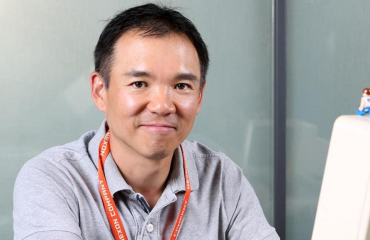World Bank and Singapore Space & Technology launch Digital Earth Partnership Technology Challenge on Urban Heat – PRNewswire
Searching for your content…
In-Language News
Contact Us
888-776-0942
from 8 AM – 10 PM ET
News provided by
Dec 23, 2021, 09:00 ET
Share this article
SINGAPORE, Dec. 23, 2021 /PRNewswire/ — Singapore Space & Technology Limited (SSTL) announces the second year of its partnership with the World Bank Group, to organize a Digital Earth Partnership Technology Challenge focused on the measurement and analysis of extreme urban heat. The challenge aims to improve our understanding of the Urban Heat Island (UHI) Effect and its impact on East Asian communities.
Like the rest of the world, Asia is getting warmer due to climate change. The UHI effect, which is caused mainly by the modification of land surfaces due to urbanisation, is exacerbating this trend. The removal of trees and other green spaces to make way for buildings and roads, the addition of heat-absorbing materials, and waste heat from energy use in buildings and transportation are adding to the already rising ambient temperature. This is a growing problem in the region as it results in reduced productivity, worse education and health outcomes, and greater energy requirements for cooling, leading to more carbon emissions. Heat waves in cities also correlate with increased crime, conflict, domestic violence, and poorer mental health. Extreme heat disproportionately impacts poor or otherwise marginalized communities and is a particular problem for the region’s developing countries.
To address these challenges, the World Bank has embarked on the EAP Regional Extreme Urban Heat Study to better assess the impacts of extreme heat exposure in the region and to inform city-level strategies to mitigate and adapt to such negative impacts. To support this study, Singapore Space & Technology and the World Bank are launching an Innovation Challenge to source satellite and other technologies to better measure temperatures in cities and analyse the strength of the UHI effect in the region.
"At Singapore Space & Technology, our mission, as an NGO, is to harness and advance space technologies to benefit communities and humanity. Global climate change in cities is worsened by the urban heat island effect and in particular, our communities are being disproportionately impacted, leading to even higher rates of air pollution, poorer water quality and associated risks to human health. I’m grateful to the participation of organizations joining hands with us in this meaningful work that can benefit generations to come." said Lynette Tan, Chief Executive of SSTL.
"At the World Bank, we are increasingly concerned about the impact of extreme urban heat resulting from climate change. The trend is exacerbated in cities around Asia due to the Urban Heat Island effect and creates a growing threat to our twin goals of ending extreme poverty and creating shared prosperity. By providing more accurate measurement and understanding of urban heat, this challenge will help inform evidence-based policies to both mitigate and adapt to this growing problem." said Francis Ghesquiere, Practice Manager of the World Bank’s East Asia & Pacific (EAP) II Urban and Disaster Risk Management team.
Participating teams will get access to technical experts from the World Bank who specialise in studying the impact of climate change on communities through workshops and clinic sessions and will have the opportunity to explore new use cases of their technology and data processing capabilities.
Participating teams should submit a full technical proposal of their proposed technical solution, methodology and sources of data to tackle the challenge statement. The deadline for the proposals is 25 February 2022. The World Bank and Singapore Space & Technology will jointly evaluate the proposals and select the winning proposal to be implemented in collaboration with the World Bank.
The award is sponsored by the Global Facility for Disaster Reduction and Recovery (GFDRR) Digital Earth Partnership. The winner of the challenge will receive the "Digital Earth Partnership Technology Award" with prize money of S$25K, and the opportunity to present their findings at the 2022 Global Understanding Risk Forum and other Fora.
The Digital Earth Partnership Technology Challenge on Urban Heat 2022 was officially launched on 3 December 2021 at the Understanding Risk Asia Forum and registrations will close on 31 December 2021: https://www.space.org.sg/digital-earth-partnership-technology-challenge/
About Singapore Space and Technology Limited (SSTL)
Established in 2007, Singapore Space and Technology Ltd (SSTL) is Asia’s leading pioneer space organisation to harness and advance space technologies to benefit people, enterprises and the planet. SSTL connects the different players in the region’s growing space sector to government agencies in the region, B2B and B2C technology companies and non-government agencies. The focus is to accelerate the adoption and commercialisation of space-related innovations, and to cultivate space talent ahead of the curve.
About World Bank Group
The World Bank Group is one of the world’s largest sources of funding and knowledge for developing countries. Its five institutions share a commitment to reducing poverty, increasing shared prosperity, and promoting sustainable development.
About Global Facility for Disaster Reduction and Recovery (GFDRR)
Global Facility for Disaster Reduction and Recovery (GFDRR) is a global partnership that helps developing countries better understand and reduce their vulnerabilities to natural hazards and adapt to climate change. Working with more than 400 local, national, regional, and international partners, GFDRR provides grant financing, technical assistance, training and knowledge sharing activities to mainstream disaster and climate risk management in policies and strategies. Managed by the World Bank, GFDRR is supported by 34 countries and 9 international organizations.
SOURCE Singapore Space and Technology Limited
Cision Distribution 888-776-0942
from 8 AM – 9 PM ET



